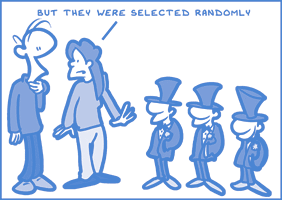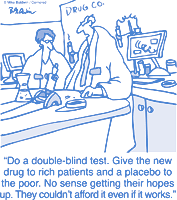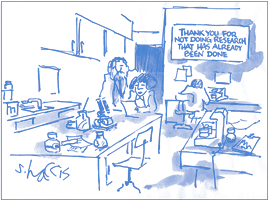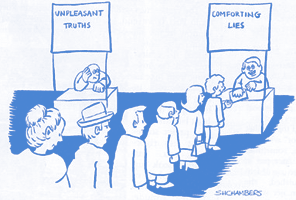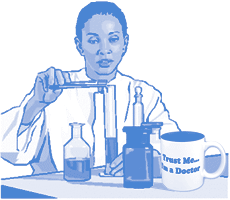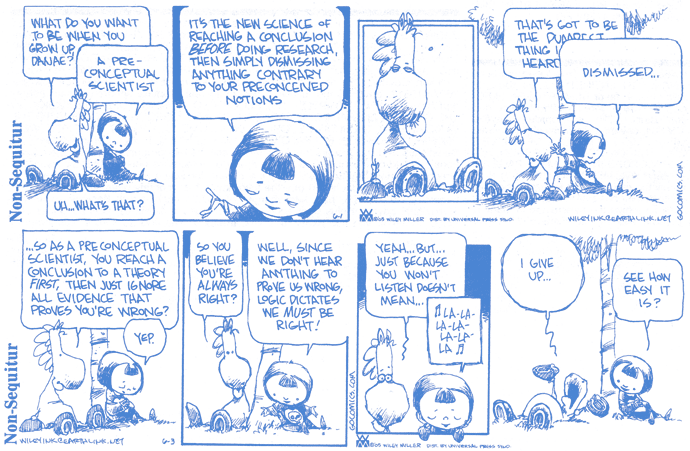

|
Knowledge. Information is out there in the world in massive amounts. This is not knowledge, but it is potential knowledge. This potential knowledge is in the objective world of reality, which all knowledge seeks to describe. There is also real and vast knowledge in this objective reality, which has been invented and tested by our ancestors, and collected for us to draw upon over thousands of years. Our problem as learners is a matter of somehow transferring the knowledge and potential knowledge in this objective world into the subjective world within our minds. In this way the information and knowledge becomes our knowledge, as it is understood by us. But how do we make this transference? We can invent our own theories and and test them ourselves, but this is a very laborious way of acquiring knowledge. We can also take the theories presented to us by others and test them, but this too would be unimaginably laborious. If we had to rely on testing every theory ourselves we would actually have time to learn very little. We would most likely still be cave men and unable to progress further. This, of course, is not the way we normally learn. Most of what we learn, is a matter of assimilating and accommodating the theories of others, into our personal models of reality, without testing them. The philosopher Karl Popper calls this the transferring of world 3 knowledge to world 2; World 3 being our cultural heritage, the body of information (knowledge?) held in common in books computers and other forms of media; while world 2 is the private and subjective world of knowledge within each individual. Every moment of our lives we are presented with information by (so called) experts or authorities. The question is how can we know if this information is correct so we can decide whether to accept it into our model of reality or not? The problem is how can we trust the theories of others sufficiently to be willing to include them in our own personal models of reality? How can we trust this information coming from outside ourselves and untested by us? How can we discern what is true in world 3 so we can incorporate into our own personal maps of reality? Now you might think the answer to this is both easy and obvious. But this is not the case. Do you think some information is likely to be true because it is presented in a newspaper? Well, you might be a bit skeptical of what is printed in newspapers. What about a prestigious scientific journal? Can you simply accept information because it appears in a prestigious scientific journal? If you think you can you would be dead wrong. But if we can't trust in scientific journals what can we trust in? The short answer is that we can't trust any authority, anyone or anything. How then do we go about choosing what to accept into our personal models of reality? Well there is both good and bad news there. In his book "Nonsense on Stilts" Massimo Pigiucci Quotes from the work of Alvin I Goldman to provide a novice with some some way of assessing the worth of a 'so called expert'. He tells us there are five criteria a novice can use to assess the worth of a possible expert as follows: The five kinds of evidence that a novice can use to determine whether someone is a trustworthy expert are:
A novice can say to himself, 'Is this new information consonant with what I already know, is it even expected from what I already know?' This is most easily accomplished by a novice when the so called expert is not an expert at all and the novice may actually have some knowledge that can easily catch the impostor out. Of course the information a novice has already accepted into his/her personal model of reality, is only a better way to judge the truth of new information, if it is comprehensive, internally consistent and (well) correct itself. If what a novice knows/believes is already wrong, then of course, information may appear consonant with it, that is also wrong. In this way people can build models of reality that are in fact wrong. In line with Goldman's first criterion, if a novice is adept at using logic, he/she can examine an expert's position in other ways. A novice can examine the opposition to our expert and assess how congruently that opposition also fits with the novice's model of reality. If the opposition to this expert fails badly in this regard this lends some credence to the expert. Likewise if the opposition succeeds in being consonant with the novice's model of reality, then this should decrease his/her confidence in the said expert. There is also area where the position of an expert can be examined by use of logic and that is by assessing whether the expert's position is itself internally consistent. Of course if the position of the expert is internally consistent this does not make it right but if it is inconsistent then we can certainly infer that that it is wrong. This too may be applied when examining the opposition.
While it is possible that the majority of experts in a particular field can be very wrong, and in fact are every time there is a huge change happening in their field, this in no way devalues the statistical relevance of an expert being supported by the majority of fellow experts in his field of endeavor. Support from a large number of fellow experts in the same field of expertise has to be a strong form of inference of expertise, if that field of endeavor is recognized by the scientific community as a whole. In other words, while it is always possible to find someone with a PhD who will support some pseudo science, it is very unlikely that the majority of PhDs, in a scientifically accredited field, will support such things. The agreement of large numbers of accredited others in a field of endeavor must be significant when a novice is assessing the worth of a possible expert.
In assessing an expert in terms of his degrees a novice should therefore, check if the degree is from a respectable university that has the reputation of not handing out degrees easily. A novice should also check if the degree is in a subject that is held to a strict scientific methodology of a science acceptable to the general scientific community. Finally a novice should check if the degree, the so called expert has obtained, is in the subject for which he/she is supposed to be an expert.
The trustworthiness of the expert is not everything. It's not enough to apply the above criteria when assessing whether the information given by someone claiming to be an expert is trustworthy information. Knowing about whether an expert is an expert or not, even if such an assessment could be accurate, does not in itself validate the trustworthiness of any information, although it is certainly a good start. Approaching truth. Some people think that science tells us what is true or that it should. But this is not possible because science is continually in a state of improving its theories. Science is continually amending, shoring up, rearranging, tearing apart and even completely axing old theories and replacing them with newer ones that are superior in what they can predict and explain. The most we can say is that the new theories are nearer to the truth than the older ones and that while science approaches closer and closer to the truth, it can either; never reach a final truth because it is beyond the limits of human ability; or if it does reach a final truth we would have no way of knowing that it had. In the book "This Will Make You Smarter" Carlo Rovelli explains it: "There is a widely held notion that does plenty of damage; the notion of 'scientifically proved.' Nearly an oxymoron. The very foundation of science is to keep the door open to doubt. Precisely because we keep questioning everything, especially our own premises, we are always ready to improve our knowledge. Therefore a good scientist is never 'certain.' Lack of certainty is precisely what makes conclusions more reliable than the conclusions of those who are certain, because the good scientist will be ready to shift to a different point of view if better evidence or novel arguments emerge."
Pseudo science and faith based explanations. Although science cannot tell us what is true it can demonstrate its superiority to pseudo science and the supernatural in terms of explanation and prediction. Science has three criteria that separate it from pseudo science. Naturalism. Firstly, science takes as given, that there is a natural cause for any effect or outcome. As far as science is concerned supernatural causes are not causes at all but rather admissions that we do not have a clue. Instead of saying we have no idea how or why something happened, we excuse our ignorance by saying god got personally involved. Pseudo science and the supernatural do not require a natural explanation, although they may sometimes give one. Theory. Secondly, science requires that any explanation must be in the form of a theory that explains observable events and is internally consistent. In his book "Nonsense on Stilts" Massimo Pigliucci explains it as follows: "The presence of coherent conceptual constructs in the form of theories and hypotheses is also a necessary component of science. Science is not just a collection of facts, as Francis Bacon thought. Theories are creative productions of the human mind and reflect our best attempts at making sense of the world as it is." Empiricism. Thirdly, science requires that a theoretical hypothesis must be empirically testable. This is the main thing that science does that makes it superior to any other kind of explanation. All scientific theories are not only tested in the research that produces them as results, but all testing must be open for others to duplicate, and is indeed duplicated before any kind of acceptance can begin. On the other hand pseudo science relies on personal testimony, coincidental occurrences and just plain faith. Unfortunately the personal testimony of a friend tends, in many minds, to be more persuasive than scientific research. However, the beauty of scientific research is that with the right equipment and expertise anyone can duplicate the research and check for themselves. This process is the backbone of science and is called empirical testing. When certain fields of science fail to do this, they can drift into being pseudo science, as were the cases of cold fusion and eugenics. Good science and bad science. Unfortunately scientists are human beings, with all the fallibilities of humans, and in evaluating the trustworthiness of scientific research a novice needs more and better ways of evaluating expertise than just examining the alleged experts. In this regard we need to look at ways a novice can distinguish good science from bad science and how and why good science can show its superiority over bad science in terms of explanation and prediction.
There is a vast apparatus of experts that decide which textbooks and curriculums will be used in schools and universities. There is also a massive checking apparatus of experts, teachers and students that continually vetting and vetoing the choices of the original experts. In fact the information that comes to us through schools is so well checked and rechecked and held back till experts are absolutely sure, that it actually out of date by the time it reaches the students. Later in university when students tend to get more up to date information there is far less likelihood of the information being correct. It is more up to date but also more speculative and cutting edge and thus there is a good possibility the information might be wrong. Indeed at that level students can be exposed to several studies and may contradict one another. Students are then learning, not facts, theories or even how to find such, but rather learning what tentative theories might be worth checking in the student's own research studies. Perhaps the best thing about schools and the institutions of education is how well they perform this one function.
"If a billiard ball starts to move before it is struck by another billiard ball, something else must have caused it to move. Conversely, if we feel the wind blow and only then see the branches of a nearby tree begin to sway, we feel safe concluding that it was the wind that caused the movement. All this is fine but just because B follows A doesn't mean that A has caused B. If you hear a bird sing or see a cat walk along a wall, and then see the branches start to move, you probably don't conclude that either the bird or the cat is causing the branches to move." The trick is of course to some how distinguish when there is a causal relation and separate those from the others. Sometimes the principle of cause and effect works beautifully and we can predict what will happen to a very fine degree. Other times its usefulness is imprecise or nonexistent. In a sense, this knowledge of the limits of knowledge, this knowledge of where our knowledge ends, is the most important knowledge we have. When we know, what we do not know, all manner of things become open to us. We start to see what questions to ask to find new knowledge and we begin to understand that it is better to do nothing than act on a delusion where we think we know something but actually do not. It is important knowledge, but it is also a cosmic joke. Unfortunately the universe simply refuses to be completely open about what is happening at any one time, thus we can incorrectly perceive causation where there is none or little. The universe seems to play tricks on us. We try to find causation by discovering patterns where phenomenon always occur together. We call this correlation. Unfortunately many phenomenon that occur together do so randomly and there is no causal connection between them. Even stranger there are occurrences of correlation called coincidence where there seems to be, or that there should be a causal connection, but there is none. On top of that, when causation does work, it usually only works statistically. In other words there is only a probability that if A occurs that B will follow. B usually follows A but there are a few occasions when it doesn't. These may be causal exceptions or they may simply be what science calls outliers. Outliers are not exceptions from the causal rule, but are simply that part of the probability that did not conform.
All this considered we should be very careful not to accept authorities and experts just because that's what they are. Charlatans have been using this feature of the universe to convince us of things that were very wrong, for as long as man had walked the earth. David H. Freedman in his book "Wrong" calls this kind bamboozling the "Hitchcock effect" after a Hitchcock story that seemed to typify how it worked as follows: "That story revolved around a man who receives a series of mailed predictions that all prove correct, at which point he is ready to trust the infallible predictor with his money - but as it turns out, the predictor had started off mailing various predictions to a large number of people, then focused each subsequent mailing on the increasingly smaller subset of people who had received only the predictions that happened to prove correct, until he had one victim who had by pure chance received all the winning predictions. It sounds like a far-fetched scheme, but in fact we often pick our leading experts this way - that is, we look back to see which expert among a field of many happened to call it right and then hold up that expert as having special insight. But we need to remember that if there are many experts predicting many things, some of those predictions will have to prove right, though it may be entirely a matter of luck or even bad judgment." "There are also non-crowd-related variations on this theme. Any one expert may be able to sort through her long history of various predictions and find the few that proved correct, holding these up to our attention while glossing over the others. Or an expert can make somewhat vague predictions, fortune-teller-style and then sharpen them after the fact to make the predictions seem highly accurate." We do not even need this to be a scam. If we believe, we tend not to notice when a predictor is wrong, but we are primed to notice when the predictor is correct. When an expert asks us to believe they are stacking the cards so we will only notice when they are right.
"I suggested that all scientific
discussion start with a problem (P1) to which we
offer some sort of tentative solution - a tentative theory
(TT); this theory is then criticized, in an attempt at error
elimination (EE); and as in the case of dialectic, this
process renews itself: the theory and its critical revision give rise
to new problems (P2) Later, I condensed this into
the following schema: Popper shows that in science each individual scientist creates and revises conjecture from analysis of their own sensory input. However, he also shows that the same sensory input can only be perceived through the lens of existing theory. Thus it follows that, without theories about how the world works, incoming sensory data is meaningless. Popper further shows that no amount of corroboration can ever validate a theory, but that a single instance of deviation can invalidate it. Not only that, but the amount of corroboration does not even improve the statistical probability that scientists are correct. Methodologically theories can not be refuted unless scientist formulate them in such a way as to show just how they could be refuted. Scientists should therefore as an article of method not try to evade refutation. Instead scientists should formulate and present their theories as unambiguously and clearly as possible, to invite refutation. Thus a truly scientific theory, is one that openly exposes itself to testing.
"Thomas Khun, the MIT science historian who famously gave the world the phrase 'paradigm shift', argued in the early 1960s that what scientists choose to measure, how they measure it, which measurements they keep, and what they conclude from them are all shaped by their own and their colleague's ideas and beliefs." How is it that, while most scientists fall into the many traps of bias, some scientists seem to excel at being fairly unbiased and manage to come up with useful findings again and again? Such people could be said to have good biases. Jack Cuzick of Cancer Research UK says, "Some people have a good nose for sniffing out right answers." This does not help the non expert in deciding who to trust because to the non expert, good biases and bad biases look exactly the same. It is likely that biases can be mitigated somewhat if scientists formulate and present their theories as unambiguously and clearly as possible, to invite refutation, and then conscientiously attempt to disprove them. Of course if biases are in fact good biases they will inevitably produce good results more than once and probably often.
Whistle blowers are not appreciated or tolerated in most walks of life and this is very true of science. David H. Freedman commented about this kind of pressure in his book "Wrong": "Gerald Koocher, the Simmons College dean who studies research misconduct, has gathered online more than two thousand anonymous accounts of research misconduct that wasn't otherwise reported. 'I wasn't surprised when I got a lot of people saying, 'I was afraid my boss would fire me if I blew the whistle on what he was doing,'' he says. 'I was more surprised to get people saying, I caught my research assistant fabricating data, so we fired them or moved them out of the lab, but we didn't report it because we were afraid our grant money wouldn't be renewed.' ...Nicholas Steneck, the ORI researcher, confirms the plentiful evidence showing the reluctance to report misconduct. 'Almost every time I speak to a group, at least one or two students or young researchers will come up to me afterward and say, 'This is what's going on. What should I do?'' he told me. 'Or they'll say, 'I'm not going to do anything about it until after I leave the lab' - but why would they report it after they've? It's almost signing your own career death warrant to blow the whistle."
The Piltdown Man (often referred to as the missing link) is a famous Anthropological hoax concerning the supposed finding of the remains of a previously unknown early human by Charles Dawson. The hoax find consisted of fragments of a skull and jawbone reportedly collected in 1912 from a gravel pit at Piltdown, a village near Uckfield, East Sussex, England. Charles Dawson claimed to have been given a fragment of the skull four years earlier by a workman at the Piltdown gravel pit. According to Dawson, workmen at the site had discovered the skull shortly before his visit and had broken it up. Revisiting the site on several occasions, Dawson found further fragments of the skull. The significance of the specimen remained the subject of controversy until it was exposed in 1953 as a forgery. Franz Weidenreich examined the remains and correctly reported that they consisted of a modern human cranium and an orangutan jaw with filed-down teeth. Weidenreich, being an anatomist, had easily exposed the hoax for what it was. However, it took thirty years for the scientific community to concede that Weidenreich was correct. The Piltdown hoax is perhaps the most famous paleontological hoax in history. It has been prominent for two reasons: the attention paid to the issue of human evolution, and the length of time (more than 40 years) that elapsed from its discovery to its full exposure as a forgery. Another famous case of a scientist faking his results was the work of Woo-Suk Hwang. Woo-Suk Hwang is a South Korean veterinarian and researcher. He was a professor of theriogenology and biotechnology at Seoul National University. He became infamous for fabricating a series of experiments, which appeared in high-profile journals, in the field of stem cell research. Until November 2005, he was considered one of the pioneering experts in the field, best known for two articles published in the journal Science in 2004 and 2005 where he reported to have succeeded in creating human embryonic stem cells by cloning. Both papers were later editorially retracted after they were found to contain a large amount of fabricated data. Hwang has admitted to various charges of fraud and on May 12, 2006, he was indicted on embezzlement and bioethics law violations linked to faked stem cell research. The Korea Times reported on June 10, 2007 that The university had expelled him (he was dismissed on March 20, 2006) and the government rescinded its financial and legal support. The government has subsequently barred Hwang from conducting human cloning research.
The failure of journals and journalists to provide us with the truth. If scientists cannot be trusted to give us expert advice, then the journals and journalist through which their expert advice is transmitted to us is doubly suspect. David H. Freedman in his book "Wrong" explains: "But more often the media simply draw the most resonant, provocative and colorful - and therefore most likely to be wrong - findings from a pool of journal-published research that already has a high wrongness rate. Generally even the most highly respected science journals and their editors want to grab our attention. They want studies that are groundbreaking, shocking, and interesting. That means almost that the very least they are looking for studies that have positive findings. Why would anybody want to read about a theory that has been disproved. David H. Freedman in his book "Wrong" provides some information: "Research by Dickersin and others suggests that on average positive studies are at least ten times more likely than negative studies to be submitted and accepted for publication. That might well mean that if one mistakenly positive study is published, on average only two of the nineteen studies that correctly ended up with negative results will be published. The seventeen others will probably go into a file draw, so to speak, or if they're submitted for publication they'll probably be rejected for having ended with negative results that simply confirmed what everyone suspected was true anyway."
Important scientific journals tend not to print negative findings. These can have very distorting impact, where theories are refuted and studies are invalidated, and nobody knows. This creates incredible waste where these theories and studies are refuted over and over again without anyone being aware that it had all been done before. What can we believe? So if all testing is methodologically inconclusive and possibly suspect, how can we ever trust any scientific findings? There are a number of indicators that help in this, but again none which is conclusive or permanent. Indeed as Popper has shown it is impossible for science to be completely conclusive. We tend to, and indeed should tentatively accept particular scientific ideas as being true, because there is consensus in the scientific community over a reasonable long period of time. However, we should also bear in mind the words of Bertrand Russell, "Even when the experts all agree, they may well be mistaken." David H. Freedman in his book "Wrong" quotes polymath Charles Ferguson who perhaps should have the last word on listening to experts. He explains: "The point isn't that you should always do what experts say, but rather that making giant sweeping decisions without listening to them at all is really dumb." Perhaps laypeople simply can't be expected to know. It is kind of sad but we are badly equipped to try and determine which experts are right if we are not expert in the field ourselves. Harvard Law School professor Scott Brewer concludes, "...laypeople simply can't be expected to figure out which experts to believe, no matter what technique they employ." Evolution and our genetic disposition almost guarantees that we will tend to ignore harsh probable truths and believe comforting lies.
David H. Freedman in his book "Wrong" provides some tips for detecting the likelihood of the grosser elements of scientists and tests fallibility, and provides some indicators of scientific accuracy, thoroughness and credibility, as follows: Typical Characteristics of Less Trustworthy Expert Advice.
Characteristics of Expert Advice we should ignore.
Some Characteristics of More Trustworthy Expert Advice.
Why do we want to believe the experts? There seems to be some evolutionary value in having special people who we understand to be more knowledgeable than ourselves in particular areas of knowledge. This is obviously an advantage to humans as a species. The problem is not the experts nor our willingness to believe they may know more than us about something. It rather the uncritical and un-skeptical way in which we tend to accept what they have to say. It is the the way we deify experts and grant them the certainty of almost omniscient powers of foresight. David H. Freedman in his book "Wrong" calls this the "Wizard of Oz effect": "We're brought up under the spell of what might be called the 'Wizard of Oz effect' - starting with our parents, and then on to teachers, and then to the authoritative voices our teachers introduce us to in textbooks, and then to mass experts whose words we see our parents hanging on in the newspapers and on TV, we're progressively steeped throughout our upbringing in the notion that there are people in the world who know much, much more than we do, and that we ought to take their word for whatever it is they say is so." What we really need, is not to simply accept expert advice because it is expert, but rather use it as a stepping off point for investigating further. There is some evidence that children that have grown up with the Internet may be more open to this skeptical approach. Expert opinion and this site. On this site a great deal of expert opinion has been presented. Just as David H. Freedman says of his book "Wrong" this site must admit that a balanced view covering all points of view has not been presented or attempted here. Also it is likely that this site is riddled with factual and conceptual errors of which we have no awareness. Perhaps some errors have snuck in because something has been misread or misunderstood. This site is guilty of all the things that Freedman complains about. However, whatever errors and biases have crept into this site it seems likely that they are of insufficient magnitude to compromise the overall arguments of this site. The arguments and messages of this site can be taken to have good possibility of being valid on the grounds that this is a massive amount of expert opinion, that is all in basic agreement, and that this agreement has taken place over a vast amount of time. These experts agree with the basic premise of this site and have done so over a long period of time. Knowing. Popper's schema for learning has other consequences for knowing. Not only is it difficult to find ways of trusting that knowledge is correct, but the tentativeness of knowledge implied by Popper's ideas makes it difficult to state that you know something. The things that we truly know cannot include theories that can be replaced by other theories at any moment. The mere fact that things have always happened does not make them certain. We believe the sun will rise in the East and set in the West every day, but there are unlikely circumstances in which this would not be so. At the North and South poles the sun does not rise or set. Also, some astronomical calamity could knock earth out of orbit etc. What we know is limited to universal agreement, in that it is how concepts are defined. We know that 1 + 1 = 2 because 2 is defined as 1 + 1. We know the rules of logic hold true and that we can use deduction to arrive at truth. However, these truths are also open to question because they always have to include some given truth. For instance it is a given that, 'All men are mortal', though that is true only until we discover or create an immortal man. So in the end what we 'know' is very little. Despite this we live in a world that is very predictable. There is a high probability that most of what we believe to be true is true or will occur as we believe. In his book "On Being Certain" Robert Burton suggests that knowing has little to do with the logic of error elimination or with careful observation and is simply an emotional feeling that occurs because evolution has found it advantageous to reward some simple associations. Burton says: "The message at the heart of this book is that the feelings of knowing, correctness, conviction, and certainty aren't deliberate conclusions and conscious choices. They are mental sensations that happen to us." Certainty. In the book "This Will Make You Smarter" Lawrence Krauss points out: "The notion of uncertainty is perhaps the least well understood concept in science. In the public parlance, uncertainty is a bad thing, implying a lack of rigor and predictability. The fact that global warming estimates are uncertain, for example, has been used by many to argue against any action at the present time. In fact, however, uncertainty is a central component of what makes science successful. Being able to quantify uncertainty and incorporate it into models is what makes science quantitative rather than qualitative. Indeed, no number, no measurement, no observable in science is exact. Quoting numbers without attaching an uncertainty to them implies that they have, in essence, no meaning." Kathryn Schulz in the same book brings to our attention the startling idea that not only is scientific knowledge uncertain but that all knowledge is uncertain. The title of her contribution is "The Pessimistic Meta-induction from the History of Science." What does that mean? She explains: "Here's the gist: Because so many scientific theories from bygone eras have turned out to be wrong, we must assume that most of todays theories will eventually prove incorrect as well. And what goes for science goes in general. Politics, economics, technology, law, religion, medicine, child rearing, education: No matter the domain of life, one generation's verities so often become the next generation's falsehoods that we might as well have a pessimistic meta-induction from the history of everything. Good scientists understand this. They recognize that they are part of a long process of approximation. They know they are constructing models rather than revealing reality. They are comfortable working under conditions of uncertainty - not just the local uncertainty of 'Will this data bear out my hypothesis?' but the sweeping uncertainty of simultaneously pursuing and being cut off from absolute truth. So knowledge in the end is not what is 'correct' or 'true' but rather what highly likely of being correct as far as we know so far. Knowing as 'certainty', for the most part, is an illusion. Very little is certain and the best theories in science are just that, theories. Our knowledge is about what has been found to give the best approximation of reality and it can be superseded at any time. It is often what some call working knowledge. It is what gets the job done, what is good enough to do what we are trying to do. Good knowledge then is always about probabilities and not about certainties. In the book "This Will Make You Smarter" Carlo Rovelli explains further: "Every knowledge, even the most solid, carries a margin of uncertainty. (I am very sure what my name is ... but what if I just hit my head and got momentarily confused?) Knowledge itself is probabilistic in nature. a notion emphasized by some currents of philosophical pragmatism. A better understanding of the meaning of 'probability' - and especially realizing that we don't need (and never possess) 'scientifically proved' facts but only a sufficiently high degree of probability in order to make decisions - would improve everybody's conceptual toolkit. However, human beings are drawn to certainty and away from ambiguities, inconsistencies and probabilities. We want the doctor diagnosing what ails us to seem certain and not tell us about probabilities. Why humans are this way may be genetically or socially transmitted. In his book "On Being Certain" Robert Burton suggests that this desire could well be socially transmitted. He says: "I cannot help wondering if an education system that promotes black and white or yes or no answers might be affecting how reward systems develop in our youth. If the fundamental thrust of education is "being correct" rather than acquiring a thoughtful awareness of ambiguities, inconsistencies and underlying paradoxes, it is easy to see how the brain reward systems might be molded to prefer certainty over open open-mindedness. To the extent that doubt is less emphasized, there will far more risk in asking tough questions. Conversely, we like rats rewarded for pressing the bar, will stick with the tried-and-true responses." In his book "On Being Certain" Robert Burton further suggests that our proclivity to want to be certain is the cause of many of societys ills and which can and has led us down many dangerous and dark paths. He believes we should try to avoid this and suggests the following: "Certainty is not biologically possible. We must learn (and teach our children) to tolerate the unpleasantness of uncertainty. Science has given us the language and the tools of probabilities. We have methods for analyzing and ranking opinion according to their likelihood of correctness. That is enough. We do not need and cannot afford the catastrophes born out of a belief in certainty. As David Gross Ph. D., and the 2004 recipient of the Nobel Prize in physics said 'The most important product of knowledge is ignorance.'" What is knowledge? Knowledge is a survival strategy put in place by evolution to to give us humans the advantage we have needed in order to survive as a species. It started out as memory that could be retrieved from our large brains when we needed it. Like many mechanisms that have evolved, its purpose has changed, but unlike most mechanisms it has kept changing and may continue to change as time goes by. The invention of writing meant that knowledge could be recorded and transmitted to others without a human's memory being involved. Knowing was still important but less so than before. With the invention of printing knowledge changed again as knowledge that was previously understood by just a few, became available to many. Knowing still had importance but because knowledge was spread fairly evenly through the species knowing became even less important than before. Now in the era of the world wide web knowledge and what we understand it to be is changing again. Do we still need to know? As has been shown above, not only is it not possible to be certain and thus know about anything, but the assumed knowing we experience is just a feeling, an emotion, and thus an illusion. The question then arises, 'Do we really need to know anything?' On the one hand, if we think that knowing means certainty then we really no longer need to know. On the other hand if by know we mean that we believe there is a very high probability of something being true, then, 'Yes we still need to know.' But even these probability assessment of actions to outcomes are only needed at the time just previous to the action and to an extent do not need to be held in memory any more. The problem is that real knowing is not just information that can be absorbed at the time of action. What happens is, that incoming data combines with knowledge held in memory at the time of action. This knowledge held in memory is a map or model of reality and is what enables understanding. Incoming information adds to it and sometimes alters it structurally enabling the apropiate action. Who knows? Knowledge then, for the most part, no longer needs to known by individual people. The survival strategy of knowing has been replaced by a more important survival strategy. The new survival strategy is knowing where to find information when you need it. This strategy has been becoming more important as knowledge has changed through the centuries. It first became important with the invention of writing and more important when printing appeared. Now with computers the world wide web and mobile phones, knowledge can be assembled (found) quickly and easily any time any where. We have already built many tools for retrieving information and consolidating it into knowledge. Search engines and social networks have begun this massive undertaking but more and better tools will be forged as time goes by. Has knowledge become too big to know? Before the advent of computers and their processing power not only was there no possibility of processing large amounts of data but the means of gathering large amounts of data did not exist for the most part. Now the opposite is the case. Now masses of data about every conceivable variable that might be significant in any experiment exists in ever increasing quantities. The processing of this mass of information by human brains is no longer possible. The most we can now do is construct computer models and let those models run to process the information for us. In his book "Too Big to Know" David Weinberger explains: "The problem - or at least the change - is that we humans cannot understand systems even as complex as that of a simple cell. It's not that we're awaiting some elegant theory that will snap all the details into place. The theory is well established already: Cellular systems consist of detailed interactions that can be thought of as signals and responses. But those interactions surpass in quantity and complexity the human brain's ability to comprehend them. The science of such systems requires computers to store all the details and to see how they interact. Systems biologists build computer models that replicate in software what happens when millions of pieces interact. It's a bit like predicting the weather, but with far more dependency on particular events and fewer general principals. Models this complex - whether of cellular biology, the weather, the economy, even highway traffic - often fail us, because the world is more complex than our models can capture. But sometimes they can predict accurately how the system will behave. At their most complex these are sciences of emergence and complexity, studying properties of systems that cannot be seen by looking only at the parts, and cannot be well predicted except by looking at what happens." "With the new database-based science, there is often no moment when the complex becomes simple enough for us to understand it. The model does not reduce to an equation that lets us then throw away the model. You have to run the simulation to see what emerges." Some knowledge has to be stored in our brains. Despite all the above, of course, some knowledge needs to remain in our memories, in out meat sack brains. Nothing would make any sense at all without our maps or models of reality, and these are made up of the facts and theories we have acquired over a lifetime. Also, a large amount of data is necessary in each individual brain in order for those individual people to be able to take part in creative activity. The future of knowing. Of course science will always require a fair amount of knowing that there is a high probability of some things happening in particular circumstances, and the people who are creative in the various scientific domains will need to know this knowledge most of all. Creative people need to know because if they do not have most of the knowledge in their domain the ideas they originate are less likely to be new and unique. However, as time goes by, science will become more and more about the systems that even the scientists that study them do not understand or know. Similarly the ordinary person will also need to know less about everything everything else and more and more about where to find information when they need it. "I can live with doubt and uncertainty and not knowing I have approximate answers and possible beliefs and different degrees of certainty about different things...it doesn't frighten me." Nobel laureate Richard Feynman Our changing understanding of what knowing is. With the gathering importance of systems research 'knowledge' or our understanding of what knowledge is may be in the process of changing and with it the very idea of knowing. When people speak of knowing in the future they may mean something far different to what people have meant by it in the past.
|
Needs Interest Method Reality Keys How to Help Creative Genius Future What is Wrong Theories Plus
Karl Popper Self Control Body Control Maria Montessori Neuroscience Brain Plasticity Memory
 The art of
knowing.
The art of
knowing.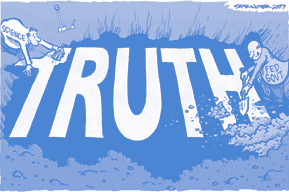
 The cosmic joke. It is
through the understanding of knowledge that we try to predict what will
happen in the universe and thus have some control over it. Humans have
come a long way in being able to do this. We have invented a principle
that ensures we will be able to do this called cause and effect. If A
then B. If A occurs then so will B or if you do A, B will occur.
Unfortunately, if we stop to think about this at all, we know that this
cannot be all there is to cause and effect. Just because B follows A
does not indicate there is cause and effect taking place. While a cause
must precede an effect the condition of two events following one
another in itself is insufficient to infer cause and effect. This is
called the post-hoc fallacy. In his book
The cosmic joke. It is
through the understanding of knowledge that we try to predict what will
happen in the universe and thus have some control over it. Humans have
come a long way in being able to do this. We have invented a principle
that ensures we will be able to do this called cause and effect. If A
then B. If A occurs then so will B or if you do A, B will occur.
Unfortunately, if we stop to think about this at all, we know that this
cannot be all there is to cause and effect. Just because B follows A
does not indicate there is cause and effect taking place. While a cause
must precede an effect the condition of two events following one
another in itself is insufficient to infer cause and effect. This is
called the post-hoc fallacy. In his book 

 Karl Popper and science. Karl
Popper shows that when we are learning we, first conjecture a possible
solution to a problem. Then we either actively test it, as a scientist
would, or accept it till the events of life seem to corroborate it or
refute it. Popper not only explains that this is the way we must learn,
but that other ways of trying to learn, if we try to adhere to them,
such as induction, are inefficient and can lead us far away from the
truth. For this reason Popper feels that following his understanding of
learning as a principle is the most efficient way of conducting
science. Popper explains this as follows in his book
Karl Popper and science. Karl
Popper shows that when we are learning we, first conjecture a possible
solution to a problem. Then we either actively test it, as a scientist
would, or accept it till the events of life seem to corroborate it or
refute it. Popper not only explains that this is the way we must learn,
but that other ways of trying to learn, if we try to adhere to them,
such as induction, are inefficient and can lead us far away from the
truth. For this reason Popper feels that following his understanding of
learning as a principle is the most efficient way of conducting
science. Popper explains this as follows in his book 
 Of course Popper's schema
for learning is by no means universal in its use as the base method for
doing scientific research. Indeed scientific research is often
conducted in ways that seem very far from this ideal. Just how far
science deviates from this ideal has been exhaustively catalogued by
David H. Freedman in his book
Of course Popper's schema
for learning is by no means universal in its use as the base method for
doing scientific research. Indeed scientific research is often
conducted in ways that seem very far from this ideal. Just how far
science deviates from this ideal has been exhaustively catalogued by
David H. Freedman in his book 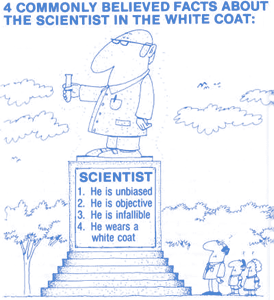
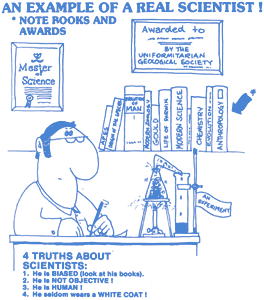
 Fallibility. All scientists are
fallible and can make genuinely innocent methodological errors. In his
book David H. Freedman tells a story about research undertaken by
Albert Einstein and Wander Johannes de Haas who measured something
called the g-factor (how much an iron bar would twist in a magnetic
field). They conjectured that the g-factor should be precisely 1 for
each atom. After about a year of fine tuning they were able to measure
a result of 1.02 using highly sensitive instruments. Unfortunately
their measurements were way off and subsequent experiments consistently
produced a g-factor of about twice that value. The point is that
Einstein and de Haas had simply measured incorrectly. If someone like
Einstein can make an error in measurement then surely any scientist
could make such an
error.
Fallibility. All scientists are
fallible and can make genuinely innocent methodological errors. In his
book David H. Freedman tells a story about research undertaken by
Albert Einstein and Wander Johannes de Haas who measured something
called the g-factor (how much an iron bar would twist in a magnetic
field). They conjectured that the g-factor should be precisely 1 for
each atom. After about a year of fine tuning they were able to measure
a result of 1.02 using highly sensitive instruments. Unfortunately
their measurements were way off and subsequent experiments consistently
produced a g-factor of about twice that value. The point is that
Einstein and de Haas had simply measured incorrectly. If someone like
Einstein can make an error in measurement then surely any scientist
could make such an
error.
 Sloppiness. Some scientists do sloppy
work that has little value. There are many and various ways for
scientists to be sloppy with data.
Sloppiness. Some scientists do sloppy
work that has little value. There are many and various ways for
scientists to be sloppy with data.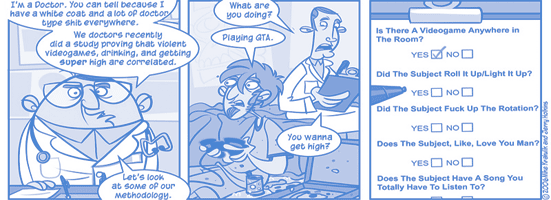
 Mismeasuring. Like Einstein all
scientist can and do make mistakes in measurement, most of them much
more sloppy that of Einstein. According to Freedman, scientists have
been known to misread blood pressure, height and heart rhythms and have
given wrong dosages and even wrong drugs. They have misrecorded the
location of subject's homes. Even when they measure correctly, they may
do so on people who do not properly represent the population such as
the young, the old, alcoholics, drug abusers, illegal immigrants and
the homeless.
Mismeasuring. Like Einstein all
scientist can and do make mistakes in measurement, most of them much
more sloppy that of Einstein. According to Freedman, scientists have
been known to misread blood pressure, height and heart rhythms and have
given wrong dosages and even wrong drugs. They have misrecorded the
location of subject's homes. Even when they measure correctly, they may
do so on people who do not properly represent the population such as
the young, the old, alcoholics, drug abusers, illegal immigrants and
the homeless.

 Surrogate measurements. The most
common way for scientists to be sloppy is by making surrogate or proxy
measurements. Surrogate measurements are those where you attempt to
discover changes in one thing by measuring something else. Unless a
long standing cause and effect has been shown between the two things
one cannot assume it to be so. This however happens very often in
research for reasons of convenience. We study animals instead of humans
because applying research to humans might damage or even kill them. We
study the flow of blood in the brain with functional magnetic resonance
imaging to try and discover what is happening in the brain. This fMRI
does not tell us directly what is happening in the brain which would
require cutting the brain open, but rather tells us how much blood is
flowing where in the brain. It might be telling us what is going on in
the brain or it might not. It is convenient not to have to cut brains
open to experiment, however.
Surrogate measurements. The most
common way for scientists to be sloppy is by making surrogate or proxy
measurements. Surrogate measurements are those where you attempt to
discover changes in one thing by measuring something else. Unless a
long standing cause and effect has been shown between the two things
one cannot assume it to be so. This however happens very often in
research for reasons of convenience. We study animals instead of humans
because applying research to humans might damage or even kill them. We
study the flow of blood in the brain with functional magnetic resonance
imaging to try and discover what is happening in the brain. This fMRI
does not tell us directly what is happening in the brain which would
require cutting the brain open, but rather tells us how much blood is
flowing where in the brain. It might be telling us what is going on in
the brain or it might not. It is convenient not to have to cut brains
open to experiment, however.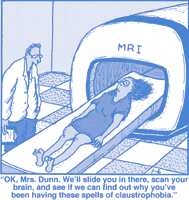

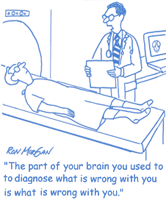

 Tossing out
or ignoring data. One way is to draw a line in the wrong
place between data that is bad or contaminated and data that is
inconvenient. One can throw out relevant data that is inconvenient.
This can be done intentionally or excusably accidentally or simply
carelessly as in sloppy work. There are many ways of tossing out data.
If data is truly contaminated that section of the data should be done
again not simply ignored or left out. Another way of tossing out data
is to simply fail to submit the whole of the research for publication.
If the research disproves what the researcher set out to prove, the
negative finding may well be more important.
Tossing out
or ignoring data. One way is to draw a line in the wrong
place between data that is bad or contaminated and data that is
inconvenient. One can throw out relevant data that is inconvenient.
This can be done intentionally or excusably accidentally or simply
carelessly as in sloppy work. There are many ways of tossing out data.
If data is truly contaminated that section of the data should be done
again not simply ignored or left out. Another way of tossing out data
is to simply fail to submit the whole of the research for publication.
If the research disproves what the researcher set out to prove, the
negative finding may well be more important. 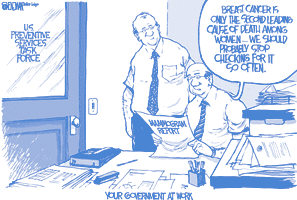
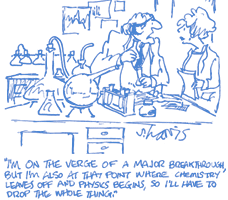
 Moving the goalposts. Another way to
be sloppy is an exercise in self deception where the scientist seeks to
discover some positive finding in the research after the research has
refuted the theory it had set out to prove or disprove. The research is
then presented as if it had set out to prove or disprove that positive
finding. This is akin to footballers moving the goalposts after the
ball has been kicked in order to insure the ball goes through them. In
research misconduct terms this is referred to as using a
retrospectoscope.
Moving the goalposts. Another way to
be sloppy is an exercise in self deception where the scientist seeks to
discover some positive finding in the research after the research has
refuted the theory it had set out to prove or disprove. The research is
then presented as if it had set out to prove or disprove that positive
finding. This is akin to footballers moving the goalposts after the
ball has been kicked in order to insure the ball goes through them. In
research misconduct terms this is referred to as using a
retrospectoscope. 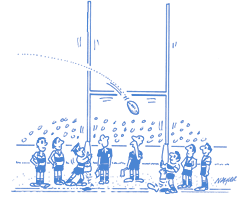
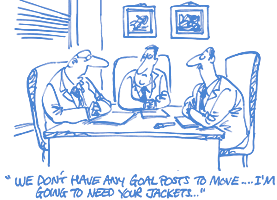
 Correlation. Just because one factor,
behavior or condition correlates with another does not necessarily
imply there is a causal relation between them. Correlations have the
same validity, whether they are presented as the findings of science,
or as random occurrences, or as coincidental patterns that we call
superstitions. If two factors always or nearly always occur together it
is possible one may be the cause of the other. There are however other
possibilities:
Correlation. Just because one factor,
behavior or condition correlates with another does not necessarily
imply there is a causal relation between them. Correlations have the
same validity, whether they are presented as the findings of science,
or as random occurrences, or as coincidental patterns that we call
superstitions. If two factors always or nearly always occur together it
is possible one may be the cause of the other. There are however other
possibilities:


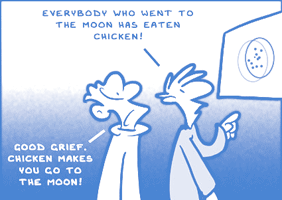
 Bias. Some scientists (perhaps most)
are led astray by their own personal beliefs. We each perceive the
world through the lens of our beliefs. It colors what we see and all
the data from our other senses. It determines how we analyze that data
and and the meaning we give to that data. Both Popper and Kelly focus
on how this is both essential to, and causes problems of accuracy for
learning. David H. Freedman in his book
Bias. Some scientists (perhaps most)
are led astray by their own personal beliefs. We each perceive the
world through the lens of our beliefs. It colors what we see and all
the data from our other senses. It determines how we analyze that data
and and the meaning we give to that data. Both Popper and Kelly focus
on how this is both essential to, and causes problems of accuracy for
learning. David H. Freedman in his book 
 Intimidation. Some scientists are
pressured into misrepresenting data by those who have power over them.
Some of this is just common sense. If a scientist works for a company
and makes a finding that is not in the company's interest the company
is obviously going to put pressure on them not to publish. If a set of
data tends to put the company in a poor light that company is going to
pressure the researcher to toss out or ignore that set of data. Imagine
scientists at tobacco companies reporting finding that tobacco could be
a factor in causing cancer.
Intimidation. Some scientists are
pressured into misrepresenting data by those who have power over them.
Some of this is just common sense. If a scientist works for a company
and makes a finding that is not in the company's interest the company
is obviously going to put pressure on them not to publish. If a set of
data tends to put the company in a poor light that company is going to
pressure the researcher to toss out or ignore that set of data. Imagine
scientists at tobacco companies reporting finding that tobacco could be
a factor in causing cancer. 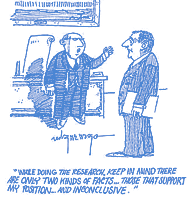
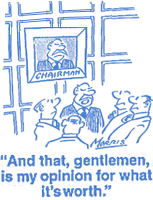
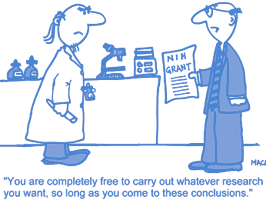

 Corruption. Some scientists are
corrupt and fake their work to increase or maintain their positions,
increase their prestige, or support their expensive tastes. Here is
what David H. Freedman says about this in his book
Corruption. Some scientists are
corrupt and fake their work to increase or maintain their positions,
increase their prestige, or support their expensive tastes. Here is
what David H. Freedman says about this in his book 
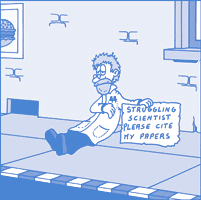
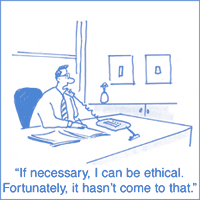
 Limits. A great deal of testing is
itself flawed. It is flawed by the limits of its very nature. David H.
Freedman concludes that there are four different basic study designs
that have varying degrees of trustworthiness but none of which is is
completely trustworthy. They are:
Limits. A great deal of testing is
itself flawed. It is flawed by the limits of its very nature. David H.
Freedman concludes that there are four different basic study designs
that have varying degrees of trustworthiness but none of which is is
completely trustworthy. They are:
